VIDEO – Two Row Teachings on the Track
OPP officers came to negotiate for an end to the closure of Mohawk lands to Canadian trains. Instead, they got a lesson about the Two Row Wampum and an offer to polish the Silver Covenant chain relationship with the Crown.
TYENDINAGA MOHAWK TERRITORY – At 10:00am on Tuesday, February 11th, three OPP liaison officers and a sheriff approached the rail shutdown on Wymans Rd. Kanenhariyo greeted the Crown agents with a Two Row wampum belt and a Silver Covenant Chain wampum belt, placed on a table on the tracks. These beaded belts symbolize treaties and agreements negotiated by the Mohawks and the Crown.
The Tyendinaga rail shutdown is now in it’s sixth day, since the pre-dawn raids on February 6th began the RCMP invasion of Wet’suwet’en territory. The Mohawks at the blockade say they will not allow any trains through their lands until the RCMP leave Wet’suwet’en territory. “We have heartfelt feelings for those people in Wet’suwet’en territory because what’s being done to them has been done to us right here.”
Addressing the Crown agents, Kanenhariyo said, “You should be ashamed of what the RCMP are doing, of what your Prime Minister is doing, they are committing crimes against our people. What else are we supposed to do [other than stop the trains]? You people have far more power than we do but all you do is sit there and cry.”
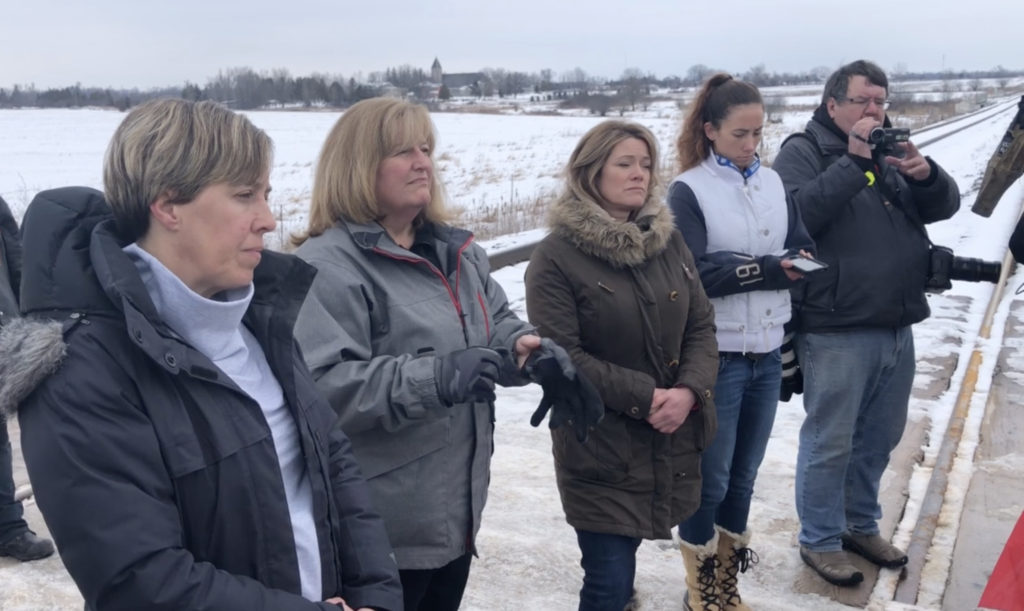
Kanenhariyo made it clear he was not a leader or a spokesperson for anyone. He identified himself as a Mohawk concerned that the OPP were making “foolish” decisions and that they had forgotten agreements like the Two Row Wampum and the Silver Covenant Chain.
Kanenhariyo began the discussion with the Thanksgiving Address, a traditional Mohawk opening and closing for gatherings which reminds participants of all that they share in common and rely upon in the natural world for their existence.
The address was delivered in the Mohawk language. “You have been invited here and you don’t speak our language,” Kanenhariyo said. “Those words are very important, and they too are a rule of this land. We told you to use them when you came here and it is clear that you forget. Those are the first words of all business and we are supposed to be thankful for everything that is providing for us here on Earth.”
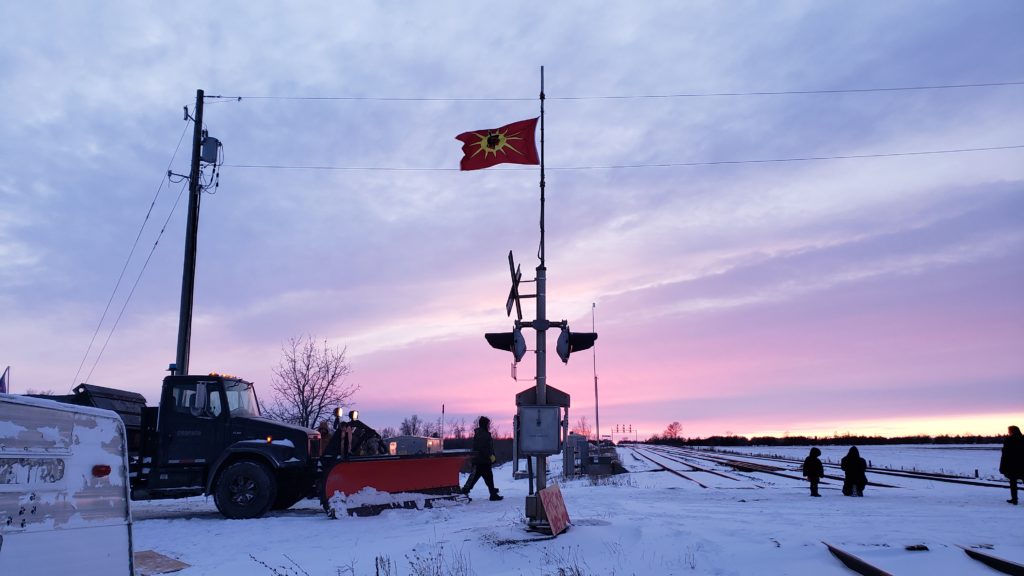
Kanenhariyo summarized in English what he had just said during the Thanksgiving Address: to be thankful for the original people; that everyone on the blockade is of one mind in thanks; to be thankful for and mindful of the water, plants, animals, trees, winds, the Sun, the Moon, the stars (our ancestors), the interconnectedness of humans, in Mohawk meaning “that energy that keeps us all warm.”
“These are the words of our ancestors. The purpose [for the Thanksgiving Address] is not that it’s a prayer. There was a time in the history of this land when people couldn’t get along, and they were fighting with each other, and there was a little boy who wanted change, so he went out and sat by himself in the forest with no food and no water for four days and he thought about all of the things that he was missing […] When he came back to his family he told his family that he thought about these words, that they should be thankful, and that every one of the people who hadn’t been getting along with each other has all these things in common.” When the people heard these words for the first time they all gathered together and embraced one another.
“This became one of the laws of this land” Kanenhariyo explained, “…and I don’t mean to be disrespectful, but when you people came here you didn’t remember that.” No response from the OPP officers.
Not waiting for an apology, Kanenhariyo turned everyone’s attention back to the two belts on the table. Gesturing to the Two Row, Kanenhariyo explained how it “is our guiding principle […] and is the basis of the relationships between men and women, the basis of the relationship between the human beings and the animals, and that’s the basis of the relationship between the Onkwehon:we and the newcomers.”
The Two Row wampum is still in effect. “It doesn’t have an expiry, it doesn’t grow whiskers or get old, it doesn’t become obsolete unless one of the parties in the river disappears.” The agreement is also one of co-operation. “It said that if there was ever rough waters ahead that we could reach over and stabilize each others boats. We had the responsibility to inform the other boat if there was troubled water ahead.” Kanenhariyo paused before addressing the OPP, “it seems there is some troubled water.”
Before moving on to the other belt on the table, Kanenhariyo wanted to make sure that everyone understood each other and how they relate to one another. “Our people understand that you are subjects of your Queen, and you are British subjects that have colonized. No matter what you say this is how we will understand our relationship because our relationship is with your Queen.”
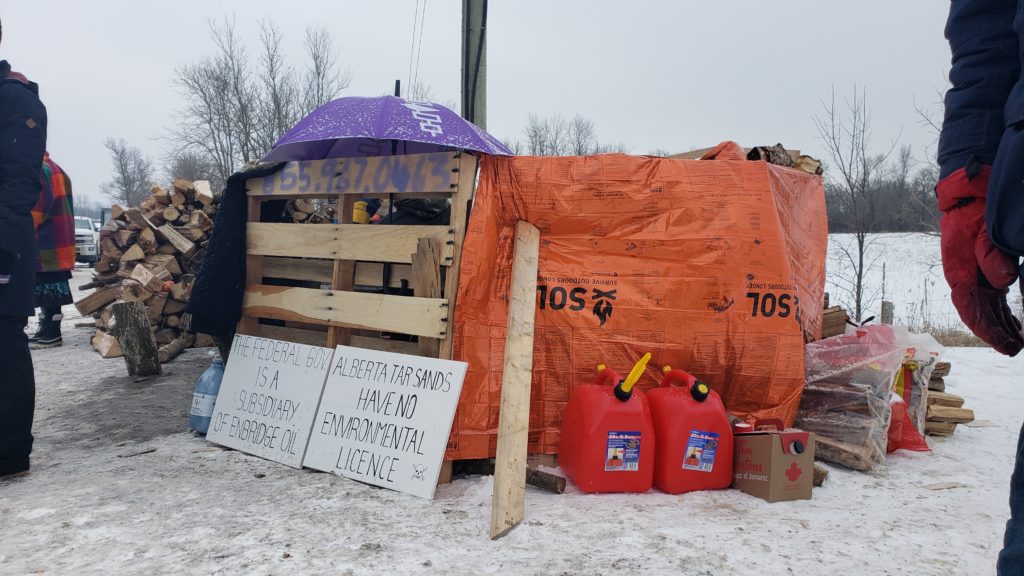
“We have a relationship with your Sovereign,” Kanenhariyo explained, “a direct one, and the last time she was here in 2010, she came and re-affirmed that relationship with us. She brought these medals and inscribed on them she described our 500 year relationship.” He went on to say that the two links of the Silver Covenant Chain symbolize the British and the Mohawk peoples, the centre link representing their joint relationship with one another. If the silver were ever to become tarnished, either side could pull on the chain to bring the two sides back together so they could together polish the chain, thus addressing the issues that had led to the “tarnishing” of the relationship between them.
“These aren’t trinkets,” Kanenhariyo implored, “this is a political matter.” Placing his hand on the belts he went on to say, “We have an obligation like you do to be bound to one another in a respectful relationship, and you have a responsibility like we do to be peaceful and sit down and polish our chain.”
The Mohawks believe the OPP are being foolish and do not understand the true nature of their relationship to Canada and the Queen. “You can’t evict us off our lands, you don’t have the right to do that, you don’t have the authority,” Kanenhariyo said.
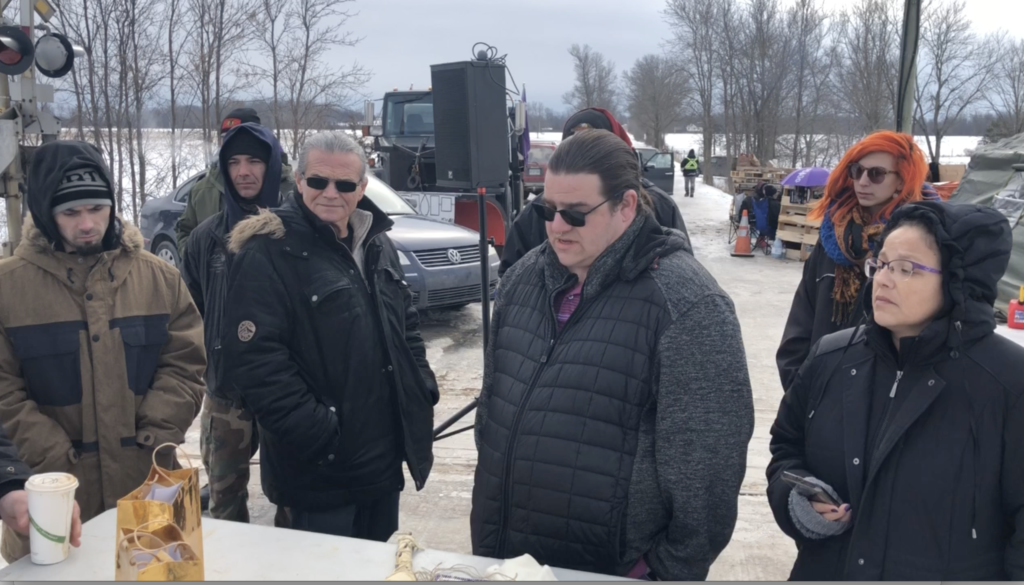
Proper process and protocol was not followed when the train tracks were originally put in. Kanenhariyo spoke of how the original Territory was marked out 5 miles deep along the shores of Lake Ontario. Later, white settlers who said they were afraid of crossing Mohawk Territory through the woods had a road put through. Then they sold plots of land along that road which would become Highway 2. The Mohawks never gave permission for any of this and have always resisted it.
The Mohawks have no desire for violence but they are concerned the OPP do not understand the stakes. “You need to send the proper people here with the proper sensitivity to understand what is occurring here and how the people feel about this place,” Kanenhariyo said. “I believe that we have a way that we can find an alternative to blood in the snow.”
The OPP offered a gift of maple syrup which Kanenhariyo declined to accept. “I don’t know that we’re in the position to receive gifts right now, you did just kind of threaten us.” He also pointed out that it was against protocol for the OPP to bring weapons to such a discussion and asked that in the future that they leave their guns behind. Despite this request the same liaison officers returned armed the next day.
Kanenhariyo stressed that he is not a spokesperson nor leader despite settler societies propensity to fit everything into a hierarchy, “We are all one, there is not one above the other.”
When given the opportunity to respond, the OPP said, “We are very appreciative of the teaching today.” They agreed that the chain needed to be polished. The OPP said, “You have made your point, I think a lot of people have heard you.” The point of the blockade is not to be heard, it is not a protest or demonstration. The purpose is to disrupt Canada’s economy and free the Wet’suwet’en from oppression. The OPP Sgt. went on to say “We would like to go home and I am sure you would like to go home to your families,” to which a Mohawk woman immediately replied, “We are home, you’re on our front lawn, and you need to go home please.”
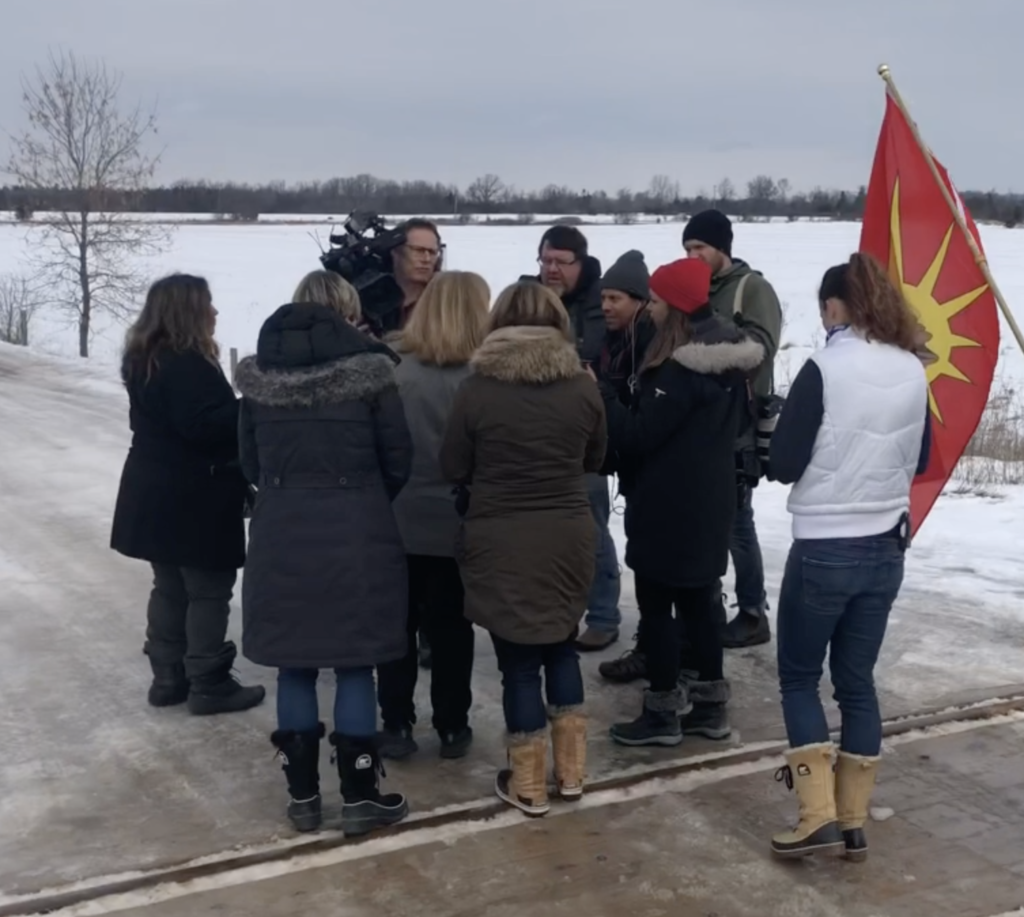
The OPP began walking away as Kanenhariyo began the closing of the Thanksgiving Address. They stopped and turned around, but continued walking away rather than listen to the rest of Address, demonstrating their ignorance of Protocol and of the fact that meetings need to be properly closed after being opened.








